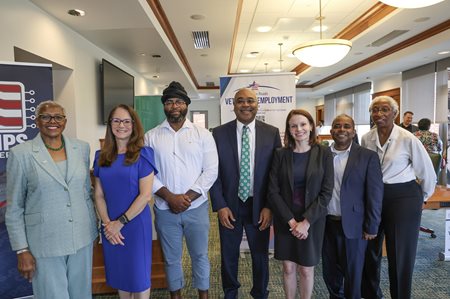Norfolk State University is playing a crucial role in re-establishing semiconductor manufacturing in the U.S. by equipping U.S. veterans with the skills needed in the field.
Today, our weapon systems rely on chips that are produced almost entirely overseas. And that, military officials say, is a national security risk.

Recently, the U.S. Department of Commerce’s CHIPS for America Program and the U.S. Department of Labor’s VETS Program visited the University to showcase veterans workforce training activities delivered through NSU’s Nanomanufacturing Certificate Program (NCP).
“What we are doing is producing people who are well-placed and prepared to be at the front end of changing the dependence that we have on other countries to produce and to provide those chips,” said Norfolk State President Javaune Adams-Gaston, Ph.D. “This is an important partnership.”
The 12-week course, approved by the U.S. Veterans Administration’s SkillBridge program, is offered in collaboration with Tidewater Community College and Pennsylvania State University and is critical to the national CHIPS for America effort to build a workforce of more than 90,000 skilled semiconductor technicians. Locally, program participants get hands-on training in the 6,000-square-foot Micron-NSU Nanofabrication Cleanroom housed in Norfolk State’s Marie V. McDemmond Center for Applied Research building.
“Pursuing a career in semiconductor manufacturing truly represents an act of service to our country and to our national security,” said Morgan Dwyer, Ph.D., CHIPS Chief Strategy Officer. “We need significant investments to create opportunities for Americans from historically underserved communities, including people of color, people from rural communities, veterans and women. We need all hands on deck.”

CHIPS for America is working with the Department of Labor's Veterans’ Employment and Training Service (VETS) program, with regional workforce organizations, and Historically Black Colleges and Universities to increase participation of economically underserved communities.
Margarita Devlin, Deputy Assistant Secretary for Operations and Management, Department of Labor Veterans’ Employment and Training Service, said her program’s mission is to help veterans transition from service back to civilian life as well as promoting equity, inclusion and accessibility for veterans and underserved communities. “We are proud to be a partner with the CHIPS program and Norfolk State University and look forward to that being ongoing,” she said.
The semiconductor certificate program meant hope for George Arthur Brokman, a combat veteran. Now that he’s graduated, he is spreading the word to fellow vets in all branches of service. “I believe in the program,” Brokman said. “They teach you everything that you need to know.”
View event photos on Flickr | See news coverage by WVEC